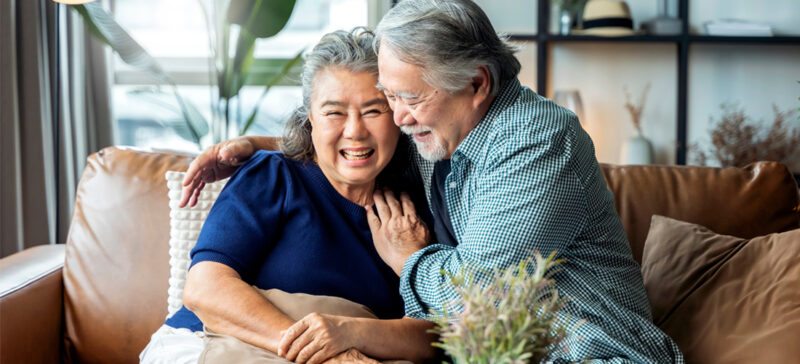Our society and people around us have a big impact on how we experience aging. So do our own attitudes. Rejecting everyday ageism is important to maintain our health and happiness.
“Flip the Script on Aging” is the theme of Older Americans Month this year. It aims to dispel stereotypes and change how we think and talk about aging.

What is Ageism?
How do the media and those around you characterize aging? Not always well. “Agesim” refers to inaccurate stereotypes and discrimination related to older adults, explains an investigation in JAMA Network Open. For example, as an older adult, you may notice that people around you might:
- Insist on helping you when you don’t need help
- Assume you can’t hear well and speak too loudly
- Assume you are cognitively limited and speak more slowly or talk down to you
- Assume you are not doing anything valuable or important
- Treat you like a child with names like “sweetie” or insult you with names like “old fogey”
Even calling someone “elderly” can have a negative impact, because it conjures up stereotypes. (A better term is “older adult”—that’s what we are!) Or someone may comment that you “look good for your age”. It’s intended as a compliment. But underneath it is an assumption that aging makes us ugly.

Researchers note that ageism can damage your physical health—and your mental health, too. The experience of ageism increases your risk of health conditions, such as heart disease, diabetes, and poor mental health.
Facing everyday ageism can lead to feelings of anger, as well as anxiety or depression. It can be a source of chronic stress. Ageism can sometimes even affect how healthcare practitioners respond to your concerns. If your symptoms are dismissed as “just old age,” this can be ageism.
Fears, Health, and Longevity
Can your own attitude about aging affect your health? Yes, say researchers. As we are exposed to ageist messages every day, we can believe them ourselves without even realizing it. We “internalize” them, explain researchers. We can become more fearful of aging, and that hurts our health. We can think the worst about ourselves.
This kind of ageism is just as common—and damaging—as ageism that comes from others.
Reframing Aging

What if we flip the script? People who have a positive view of aging live, on average, 7.5 years longer than people who hold a negative view. Yes, rejecting ageism can help you live a better life.
If someone says something ageist to you, you can gently correct them with a different message, e.g., “I don’t think of myself as elderly. I am an older adult with a lot going for me.” Speaking to a doctor you feel is not listening, you might say, “I don’t want to assume my symptoms are old age. What are some other alternatives?”
In some situations, you may not choose to say anything out loud. But pay attention to what you tell yourself. Your own positive message can help protect your well-being. Older adults have many strengths, some that are truly unique to later life.

Explains the National Center to Reframe Aging, a message all of us need to hear is this: “Aging is a dynamic process that leads to new aspirations, abilities, and knowledge we can share with our communities.” They urge us to “tell a more complete story of aging”.
The “Mature Mind”
To hear that story, it helps to understand how our brains change and grow through the years. In a book called The Mature Mind, Gene Cohen, a psychiatrist and gerontologist, reveals what he calls “the positive power of the aging brain”.
Rejecting the stereotype of decline in aging, he explains that older adults continue growing and developing in unique ways. We are more adaptable than stereotypes would tell. As we go through the phases of life, he says, we can become more liberated. Our brains from new connections. We grow in perception and judgement.
The speed at which we process information may naturally slow down with age. However, older adults can often become more creative, better at using both sides of the brain together, and very skillful at solving problems. This comes from an age-related skill psychologists call “crystalized intelligence,” the knowledge and abilities that come from years of living.

Because of experiences and a lifetime of using the brain, older adults can also be better at accepting life’s realities and adapting to change. They can often achieve stronger emotional balance. “The capacity to ride out emotional storms more flexibly and resiliently is one of the fruits of aging,” says Cohen.
With aging, many people can experience a greater sense of self. When older adults continue to seek out new experiences or learn new things, the brain “actively grows and rewires itself,” says Cohen. He encourages effective wellness practices, like staying social, exercising, learning new things, and being creative. All of these tap into the power of the aging brain.
Spiritual Growth
Experts on aging have explored how older adults experience spiritual growth, too. “Old age can be seen as a distinct life stage in which individuals develop new understandings of nature, time, and the universe,” explain gerontologists. The term for this is “gerotranscendence”. Older adults can sometimes see life through a different lens—a larger one that delivers new awareness and deepens spiritual connections.

This greater spiritual awareness can be the secret to being able to “go with the flow” and adapt to the physical changes of aging, say researchers. Whatever your spiritual beliefs or practices may be, aging may help you find new meaning. Spiritual growth in aging gives us a “framework” to deal with painful events, making us more resilient. It deepens our sense of self and our understanding of life, they explain.
Even if we face challenges, aging has its perks. Older adults have many gifts and talents to share. You can reject ageist ideas and take pride in this special stage of life.


